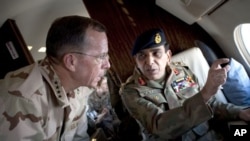The top U.S. military officer is on a visit to Afghanistan, where he says the coalition effort is in its execution phase, after months of preparation to implement President Barack Obama's new strategy.
With the U.S. government and the military facing criticism for not achieving dramatic results in the eight months since the president announced his strategy, Admiral Mullen spent part of his day appealing for patience, at least until the end of the year.
He told diplomats at the U.S. embassy that he and the new U.S and NATO commander here, General David Petraeus, agreed it is time to start delivering. "Where he and I believe we are now is we are in execution. We know what we need to do. We know how to do it. We have the people, the resources. Now we have to execute, and it is where we are. And this next 12 months, from my perspective, will be as critical a 12 months in terms of turning this around as any," he said.
A December review is designed to ensure the strategy of sending more troops and taking control of civilian areas from the Taliban, is at least beginning to show results. By next July, President Obama says he will begin what is expected to be a gradual withdrawal of U.S. troops. The admiral says the key dates can be met, and he has been reassuring every audience he has spoken to on this trip that the United States will not run for the exits next year.
But with the president's deadline looming to begin to transfer responsibility to Afghan security forces, Admiral Mullen says current operations in Eastern Afghanistan, which he visited Sunday, and southern Afghanistan, which he will visit Monday, are crucial to the overall mission.
He says the main southern city of Kandahar, a Taliban stronghold, is particularly important. "I have likened this to the time that we were in the surge window specifically in Baghdad in Iraq a couple of years ago. And I think Kandahar has the same kind of strategic impact, potentially," he said.
The last of the 30,000 additional U.S. troops President Obama ordered to deploy here are expected to arrive by September, and many will go to the Kandahar area to reinforce an already-expanded operation, which has been laying the groundwork for taking control of the city.
But what had been expected to be a second, more violent phase, of the operation has not materialized, partly to wait for the additional troops and partly to allow more time to work with local leaders to get them to support the plan.
And NATO's top diplomat in Afghanistan, Ambassador Mark Sedwill, says the second phase will not involve major military operations in Kandahar City. "It is essentially a police action within the city itself. You will not see a lot a troops. It is reinforcing the police presence and the police capability within the city. So (that means) building up checkpoints, building up the numbers of police, putting civil order police in there who are more capable, et cetera,' he said.
Officials say the results of such efforts are more difficult to quantify than military advances are in a different kind of war. Ambassador Sedwill said potential indicators of progress include such things as economic development, measurements of people's confidence in their government and turnout for parliamentary elections, scheduled for September.




